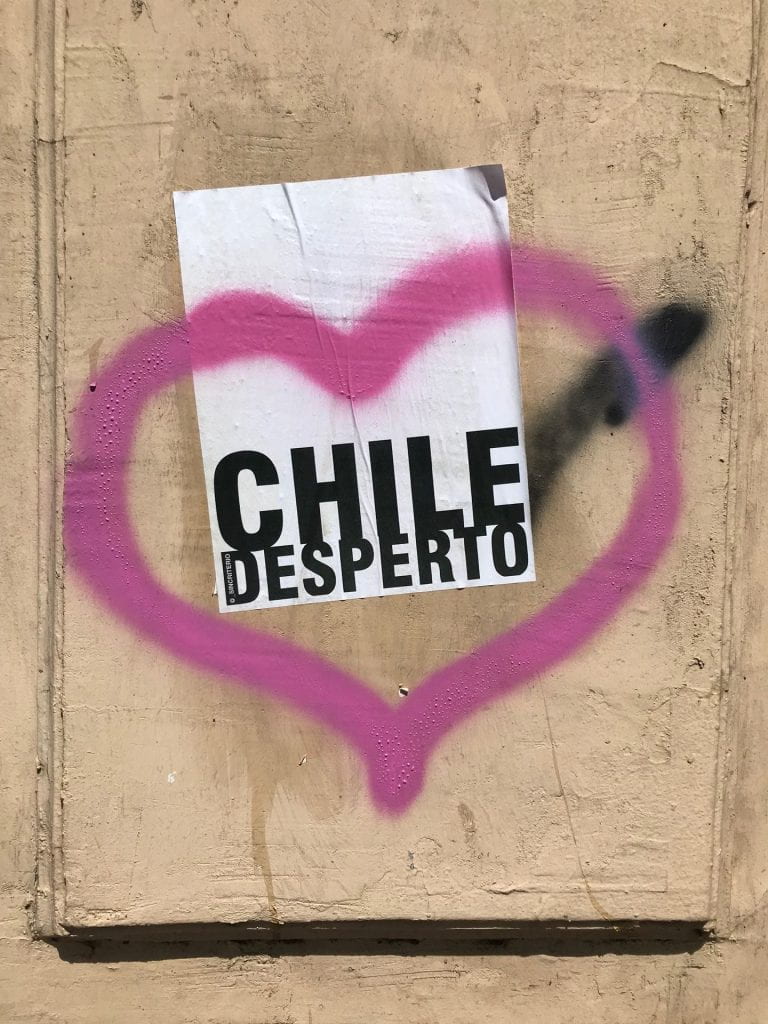In the fall of 2019, during my Fulbright Fellowship in Chile, which coincided with a social revolution that continues to reverberate across Chilean society, a large graffiti-mural caught my attention along a wall in downtown Santiago: “Tu normalidad es privilegio!”
The statement was no doubt aimed at the middle- and upper-class denizens who had grown critical of on-going demonstrations that had resulted in shuttered businesses, surfaces defaced by protest graphics, and monuments and public spaces overrun by youth refusing to accept a state of order. From the protesters’ perspective, the “normalcy” of a before October 18th (when the estallido social erupted) was one characterized by class blindness and the smug belief that Chile, with its spectacular macro-economic accomplishments, was a model of Latin American exceptionalism. No wonder the prevailing protest slogan of the estallido was a metaphor of awakening: “Chile Despertó!”
Of late, I’ve been thinking a lot about the idea of normalcy, of how we’ve lost our sense of normalidad due to the pandemic, and how, in so many ways, our anxious yearning to “return to normal” may not only be a lost cause but perhaps a misguided one. For nearly a year, we have been living in a science fiction novel. At least, that’s how it’s come to feel to me. And we’ve adapted: to communicating via Zoom, to living 24/7 in a full house (with kids, if you’re a parent; with your parents, if you’re a kid), to not really going anywhere. It’s actually going to be much harder than we assume to “get back to normal.” For one, this fear of the virus that we all have internalized will be very difficult to get rid of. Even once we are fully vaccinated, there will still be deep and lingering concerns about effectiveness, new mutations, and continued vulnerabilities. Sadly, we’ve grown accustomed to wearing masks, however much we claim to loathe them. Masks now feel normal, and they are likely to play a large role in whatever a “return to normalcy” looks like.
Second, we’ve grown to appreciate the ease of Zoom. Why spend over an hour to commute to a meeting with a professor or a colleague when that can readily be dealt with by staying in place? The argument to be “in person” for every meeting will be hard to sustain now that we’ve all tasted the relative efficiencies of our sci-fi present. Moreover, Zoom has opened up an incredible world for academic exchange. Over the past year, I have traveled multiple times to Mexico, Chile, Uruguay and elsewhere—all from the comfort of my desk chair. And with a zero environmental footprint (energy for the Internet, notwithstanding). Travelling hundreds or thousands of miles by plane to give a talk for an audience of twenty will no doubt feel very different when we’re back to “normal.” The future will surely be hybrid.
Which brings me to the last thought on what a longing to “return to normal” implies. We are now all wide awake, despiertos, as the Chilean protesters would say. Normalcy pre-2020 does seem like a privilege and in more ways than one. During the pandemic, new keywords transformed our everyday vocabulary: equity, essential workers, inequality of access. These keywords have helped render visible the fault lines of class and race that course through our communities, and our nation. Only by remaining willfully blind to the privileges from which we, in the elastic, relatively comfortable middle classes, continue to benefit can one demand a return to “normalcy.” A reckoning with deep-seated class and racial inequities is already underway and will likely spill into the streets and continue to transform everyday politics once the suffocating veil of the virus begins to lift.
As vaccination becomes more widespread, we will need to start to think more seriously about what is meant by “getting back to normal.” As with in Chile, normalidad as we once knew it is no longer an option. But nor is it necessarily desirable. We have seen and experienced things during this pandemic that have truly awakened us: to privilege and inequity, as well as to the potential of technology to enervate but also to liberate.
Eric Zolov is Professor of Latin American History and Director of Undergraduate Studies at Stony Brook University. He is the author most recently of The Last Good Neighbor: Mexico in the Global Sixties (Duke, 2020) and co-author with Terri Gordon-Zolov of The Walls of Santiago: Social Revolution and Political Aesthetics in Contemporary Chile (Berghahn, 2021; in press).
This piece was also published in the Stony Brook Undergraduate History Journal.



